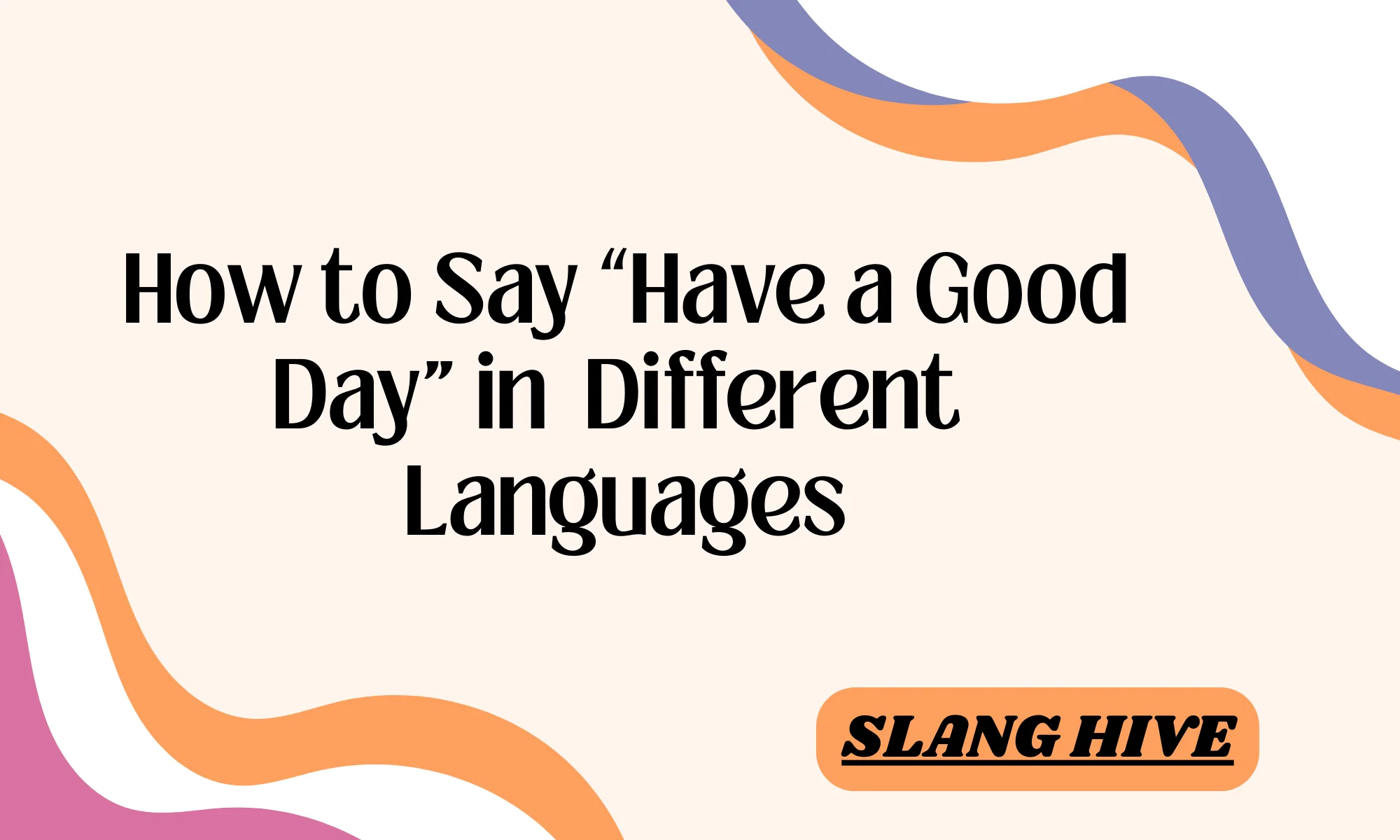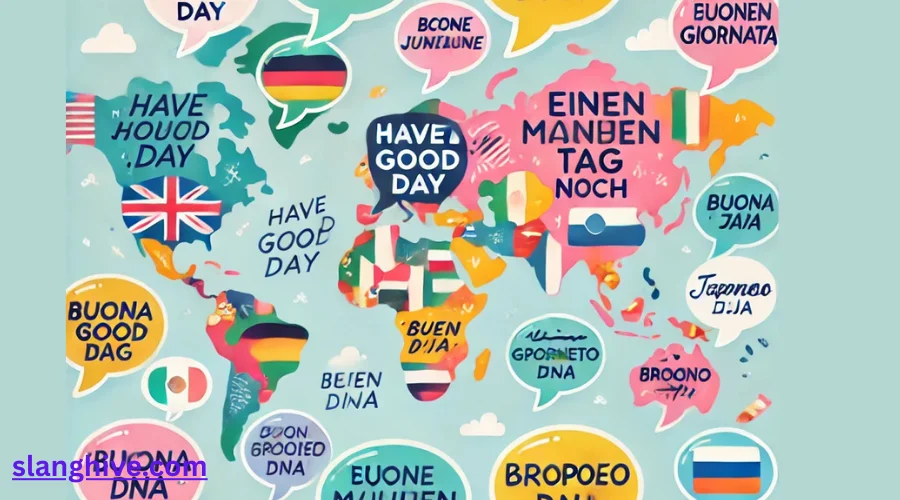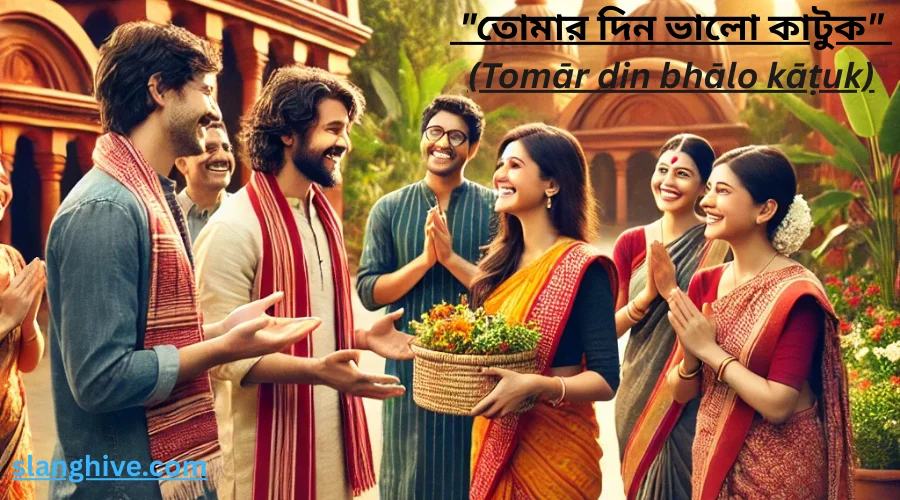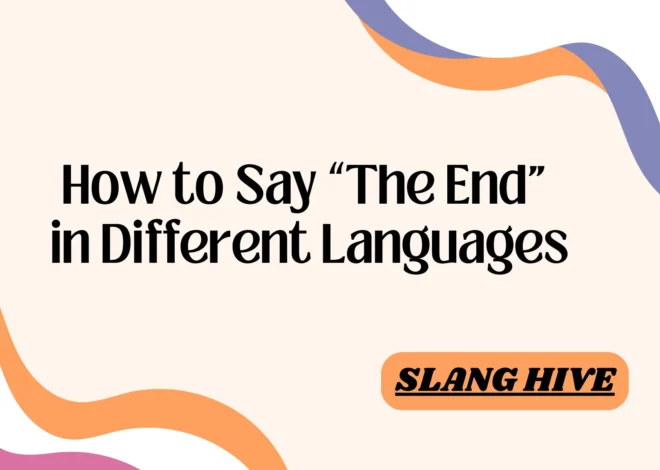
How to Say “Have a Good Day” in 100+ Different Languages
Wishing someone “have a good day” is a simple yet meaningful way to spread positivity. Whether you’re saying goodbye to a friend, wrapping up a meeting, or greeting a stranger, this phrase carries warmth and goodwill. In this comprehensive guide, we’ll explore how to say “have a good day” in different languages, while also diving into polite, professional, and casual alternatives to enrich your expressions. We’ll cover the nuances of tone, context, and how to pick the perfect phrase for any moment.
Let’s embark on this global journey of well-wishing!
“Have a Good Day” in Different Languages
Here’s a natural, flowing exploration of how “have a good day” is expressed worldwide. Each entry is written simply and uniquely, avoiding repetition, so you can enjoy the diversity of these daytime blessings.

- Spanish: “Que tengas un buen día” – A warm and versatile wish from Spain to Latin America.
- French: “Passe une bonne journée” – Elegant and friendly, a French classic.
- German: “Hab einen guten Tag” – Precise and heartfelt, quintessentially German.
- Italian: “Buona giornata” – Smooth and melodic, an Italian staple.
- Portuguese: “Tenha um bom dia” – Cheerful and welcoming, from Portugal to Brazil.
- Russian: “Хорошего дня” (Khoroshego dnya) – A hearty “good day” wish.
- Chinese (Mandarin): “祝你一天愉快” (Zhù nǐ yītiān yúkuài) – A calm “wish you a pleasant day.”
- Japanese: “良い一日を” (Yoi ichinichi o) – Polite and gentle, meaning “a good day to you.”
- Korean: “좋은 하루 되세요” (Joeun haru doeseyo) – Kind and formal, “have a good day.”
- Arabic: “أتمنى لك يومًا سعيدًا” (Atamanna laka yawman saʿīdan) – A poetic “I wish you a happy day.”
- Hindi: “आपका दिन अच्छा हो” (Aapka din achha ho) – A respectful “may your day be good.”
- Swahili: “Uwe na siku njema” – A rhythmic “have a good day” from East Africa.
- Greek: “Να έχεις μια καλή μέρα” (Na écheis mia kalí méra) – Cheerful and timeless in Greek.
- Turkish: “İyi bir gün geçir” – Warm and direct, a Turkish favorite.
- Dutch: “Fijne dag” – Cozy and concise, meaning “nice day.”
- Polish: “Miłego dnia” – Soft and polite, a Polish well-wish.
- Vietnamese: “Chúc bạn một ngày tốt lành” – A friendly “wish you a good day.”
- Thai: “ขอให้มีวันที่ดี” (Khǒ hai mī wạn thī dī) – Graceful and kind, a Thai blessing.
- Hebrew: “שיהיה לך יום טוב” (Sheyihyeh lecha yom tov) – Bright and sincere, “may you have a good day.”
- Bengali: “তোমার দিন ভালো কাটুক” (Tomār din bhālo kāṭuk) – A warm “may your day go well.”

- Czech: “Měj hezký den” – Simple and kind, a Slavic gem.
- Hungarian: “Kellemes napot” – Distinctive and melodic, “pleasant day.”
- Finnish: “Hyvää päivää” – Soft and soothing, a Nordic wish.
- Norwegian: “Ha en god dag” – Minimalist and kind, Scandinavian style.
- Swedish: “Ha en bra dag” – Similar to Norwegian, with a Swedish twist.
- Danish: “Hav en god dag” – Compact and friendly, another Nordic delight.
- Romanian: “Să ai o zi bună” – Flowing and pleasant, a Romanian blessing.
- Ukrainian: “Гарного дня” (Harnoho dnya) – A cozy “good day” from Ukraine.
- Persian: “روز خوبی داشته باش” (Rooz-e khubi dāshte bāsh) – Poetic and graceful, “have a good day.”
- Malay: “Semoga hari anda baik” – Polite and versatile, “may your day be good.”
- Indonesian: “Semoga harimu menyenangkan” – A warm “may your day be pleasant.”
- Tagalog: “Matuwa ka sa iyong araw” – A heartfelt “enjoy your day” from the Philippines.
- Urdu: “آپ کا دن اچھا گزرے” (Aap ka din acha guzre) – Elegant “may your day go well.”
- Tamil: “உங்கள் நாள் நன்றாக இருக்கட்டும்” (Uṅkaḷ nāḷ naṉṟāka irukkaṭṭum) – A respectful “may your day be good.”
- Telugu: “మీ రోజు బాగుండాలని కోరుకుంటున్నాను” (Mī rōju bāguṇḍālani kōrukuṇṭunnānu) – A kind “I hope your day is good.”
- Kannada: “ನಿನಗೆ ಒಳ್ಳೆಯ ದಿನವಾಗಲಿ” (Ninage oḷḷeya dinavāgali) – A gentle “may you have a good day.”
- Marathi: “तुझा दिवस चांगला जावो” (Tujhā divas chāṅglā jāvo) – Warm “may your day be good.”
- Gujarati: “તમારો દિવસ સારો રહે” (Tamāro divas sāro rahe) – A soothing “may your day be good.”
- Punjabi: “ਤੁਹਾਡਾ ਦਿਨ ਵਧੀਆ ਹੋਵੇ” (Tuhāḍā din vadhīā hove) – Bold and friendly, “may your day be great.”
- Sinhala: “ඔබට සුභ දිනයක් වේවා” (Obaṭa subha dinayak vēvā) – A melodic “may you have a good day.”
- Albanian: “Kalofsh një ditë të mirë” – Simple and charming, “have a good day.”
- Bulgarian: “Приятен ден” (Priyaten den) – A warm “pleasant day” wish.
- Croatian: “Ugodan dan” – Soft and concise, “pleasant day.”
- Serbian: “Угодан дан” (Ugodan dan) – Nearly identical to Croatian, with Cyrillic flair.
- Slovak: “Prajem pekný deň” – Inviting and polite, “I wish you a nice day.”
- Slovenian: “Imej lep dan” – A smooth “have a nice day” from Slovenia.
- Latvian: “Lai tev laba diena” – Unique and kind, “may you have a good day.”
- Lithuanian: “Geros dienos” – Flowing and cozy, “good day.”
- Estonian: “Head päeva” – Crisp and kind, “good day.”
- Icelandic: “Eigðu góðan dag” – Rugged yet warm, “have a good day.”
- Irish: “Bíodh lá maith agat” – A lilting Gaelic “have a good day.”
- Scottish Gaelic: “Gum bi latha math agad” – Similar to Irish, with a Scottish twist.
- Welsh: “Cael diwrnod da” – A soft and rolling “have a good day.”
- Basque: “Egun ona izan” – A unique “have a good day” from this ancient language.
- Catalan: “Que tinguis un bon dia” – Warm and concise, “have a good day.”
- Galician: “Ten un bodía” – Friendly and akin to Portuguese, “have a good day.”

- Maltese: “Il-ġurnata t-tajba” – A Semitic “good day” with Mediterranean charm.
- Luxembourgish: “Hutt en schéinen Dag” – Cozy and compact, “have a nice day.”
- Macedonian: “Има* “Пријатен ден” (Prijaten den) – A Slavic “pleasant day.”
- Armenian: “Հաճելի օր ունեցեք” (Hajeli or unets’ek’) – A tender “have a pleasant day.”
- Georgian: “გისურვებთ კარგ დღეს” (Gisurvebt k’arg dges) – A poetic “I wish you a good day.”
- Azerbaijani: “Gününüz xeyirli olsun” – A warm “may your day be good.”
- Kazakh: “Күніңіз жақсы болсын” (Küniñiz jaqsy bolsyn) – A kind “may your day be good.”
- Uzbek: “Kuningiz yaxshi bo‘lsin” – Similar to Kazakh, “may your day be good.”
- Kyrgyz: “Күнүңүз жакшы болсун” (Künüñüz jakshy bolsun) – A friendly “may your day be good.”
- Tajik: “Рӯзи хуб дошта бошед” (Rūzi khub doshta boshed) – A Persian-influenced “have a good day.”
- Turkmen: “Günüňiz gowy bolsun” – A heartfelt “may your day be good.”
- Mongolian: “Сайн өдөр болоорой” (Sain ödör bolooroi) – A robust “have a good day.”
- Nepali: “तिमीलाई राम्रो दिन होस्” (Timīlāī rāmro din hos) – A calm “may you have a good day.”
- Burmese: “နေ့တစ်နေ့ကောင်းပါစေ” (Ne tànè kaùn bà zè) – A warm “may your day be good.”
- Khmer: “សូមឲ្យអ្នកមានថ្ងៃល្អ” (Som aoy neak mean thngai la-or) – A polite “may you have a good day.”
- Lao: “ຂໍໃຫ້ທ່ານມີມື້ທີ່ດີ” (Khǒ hai thān mī mū thī dī) – A friendly “may you have a good day.”
- Hmong: “Thov kom koj muaj ib hnub zoo” – A unique “may you have a good day.”
- Zulu: “Ngifisela usuku oluhle” – A rhythmic “I wish you a good day.”
- Xhosa: “Ndikunqwenelela usuku olumnandi” – Similar to Zulu, “I wish you a pleasant day.”
- Afrikaans: “Hê ’n goeie dag” – A Dutch-influenced “have a good day.”
- Somali: “Maalin wanaagsan” – A flowing “good day” from the Horn of Africa.
- Amharic: “መልካም ቀን ይሁንልህ” (Melkam qen yihunilih) – A rich “may you have a good day.”
- Hausa: “Ina fatan alheri a yau” – A warm “I hope you have a good day.”
- Yoruba: “Ki o ni ọjọ rere” – A smooth “may you have a good day.”
- Igbo: “Ka ị nwee ụbọchị dị mma” – A distinctive “may you have a good day.”
- Shona: “Uve nezuva zvakanaka” – A warm “have a good day” from Zimbabwe.
- Sesotho: “Eba le letsatsi le monate” – A melodic “have a pleasant day.”
- Tswana: “O nne le letsatsi le le botoka” – A friendly “have a good day.”
- Maori: “Kia pai tō rā” – A gentle “may your day be good.”
- Hawaiian: “E hauʻoli i kou lā” – A soft “enjoy your day” from Polynesia.
- Samoan: “Ia manuia lou aso” – A warm “may your day be good.”
- Tongan: “Ke sai pē hoʻo aho” – A rhythmic “have a good day.”
- Fijian: “Ni sa bula vinaka e na siga” – A cheerful “have a good day.”
- Esperanto: “Havu bonan tagon” – A fitting “have a good day” in this global language.
- Bosnian: “Ugodan dan” – A simple “pleasant day” wish.
- Belarusian: “Добрага дня” (Dobraga dnya) – A cozy “good day” from Belarus.
- Pashtoاختیاری: “ورځ مو ښه وي” (Wraz mo kha wi) – A bold “may your day be good.”
- Sindhi: “توکي سٺو ڏينهن ٿئي” (Toke sutho dinhen thee) – A warm “may you have a good day.”
- Malagasy: “Mirary anao andro tsara” – A melodic “wishing you a good day.”
- Luxembourgish: “Hutt en schéinen Dag” – A compact “have a nice day.”
- Sundanese: “Wilujeng tepang dinten” – A gentle “have a good day” from Indonesia.
- Javanese: “Sugeng dina” – A concise “good day” wish.
- Kurdish (Kurmanji): “Roja te xweş be” – A heartfelt “may your day be good.”
- Pashto: “ورځ مو ښه وي” (Wraz mo kha wi) – A strong “may your day be good.”
- Quechua: “Allin p’unchay kachun” – A unique “may you have a good day” from the Andes.
- Aymara: “Sum p’unchäwi sarañani” – A rare “have a good day” from South America.
- Guarani: “Mba’éichapa peteĩ ára porã” – A warm “how about a good day” from Paraguay.
These phrases showcase the richness of global goodwill. From the poetic “Atamanna laka yawman saʿīdan” in Arabic to the cozy “Fijne dag” in Dutch, each offers a unique way to brighten someone’s day.
Alternatives to “Have a Good Day” in English
While “have a good day” is a timeless classic, English provides a variety of alternatives to match different tones and contexts. Below are 25 polished examples, each with its nuance, context, and a sample use to inspire you.
1. “Enjoy Your Day”
- Tone: Warm and casual.
- Context: Perfect for friends or informal farewells.
- Example: “Enjoy your day—hope it’s full of fun!”
2. “Wishing You a Great Day”
- Tone: Kind and polite.
- Context: Suits general or semi-formal goodbyes.
- Example: “Wishing you a great day—see you soon!”
3. “Make It a Good One”
- Tone: Playful and encouraging.
- Context: Great for casual chats or motivating someone.
- Example: “Make it a good one—you’ve got this!”
4. “Have a Wonderful Day”
- Tone: Cheerful and upbeat.
- Context: Ideal for spreading positivity.
- Example: “Have a wonderful day—smile lots!”
5. “All the Best Today”
- Tone: Neutral and versatile.
- Context: Fits both casual and professional settings.
- Example: “All the best today—hope it goes smoothly.”
6. “Here’s to a Fantastic Day”
- Tone: Enthusiastic and friendly.
- Context: Perfect for an energetic send-off.
- Example: “Here’s to a fantastic day—cheers to you!”
7. “Take Care Today”
- Tone: Caring and gentle.
- Context: Works for heartfelt or thoughtful farewells.
- Example: “Take care today—stay safe out there.”
8. “Hope Your Day Shines”
- Tone: Bright and poetic.
- Context: Great for an uplifting or creative goodbye.
- Example: “Hope your day shines—you deserve it!”
9. “Best Wishes for Today”
- Tone: Formal and considerate.
- Context: Suits professional or polite exchanges.
- Example: “Best wishes for today—good luck with your meeting.”
10. “Have a Blast Today”
- Tone: Fun and informal.
- Context: Ideal for friends or casual settings.
- Example: “Have a blast today—let me know how it goes!”
11. “May Your Day Be Awesome”
- Tone: Bold and positive.
- Context: Great for an enthusiastic boost.
- Example: “May your day be awesome—you’re a rockstar!”
12. “Enjoy Every Moment Today”
- Tone: Thoughtful and warm.
- Context: Fits meaningful or sincere goodbyes.
- Example: “Enjoy every moment today—it’s all yours.”
13. “Have a Smooth Day”
- Tone: Calm and reassuring.
- Context: Perfect for wishing ease and peace.
- Example: “Have a smooth day—no stress allowed!”
14. “Wishing You Daytime Joy”
- Tone: Light and whimsical.
- Context: Ideal for a cheerful or quirky farewell.
- Example: “Wishing you daytime joy—go sparkle!”
15. “Good Vibes Your Way”
- Tone: Trendy and relaxed.
- Context: Great for younger crowds or informal chats.
- Example: “Good vibes your way—keep it cool!”
16. “Have a Stellar Day”
- Tone: Upbeat and unique.
- Context: Suits an energetic or standout goodbye.
- Example: “Have a stellar day—shine bright out there!”
17. “Cheers to Your Day”
- Tone: Friendly and sociable.
- Context: Perfect for a toast-like send-off.
- Example: “Cheers to your day—make it a good one!”
18. “Hope It’s a Great One”
- Tone: Simple and hopeful.
- Context: Works in most casual settings.
- Example: “Hope it’s a great one—catch you later!”
19. “Wishing You a Day of Smiles”
- Tone: Sweet and positive.
- Context: Great for spreading happiness.
- Example: “Wishing you a day of smiles—you’ve earned it!”
20. “Have a Day Full of Good Things”
- Tone: Warm and generous.
- Context: Fits heartfelt or kind farewells.
- Example: “Have a day full of good things—enjoy every bit!”
21. “Make Today Amazing”
- Tone: Motivational and bold.
- Context: Ideal for inspiring someone.
- Example: “Make today amazing—you’ve got the power!”
22. “Here’s to a Day Well Spent”
- Tone: Reflective and friendly.
- Context: Suits a thoughtful or relaxed goodbye.
- Example: “Here’s to a day well spent—hope it’s perfect.”
23. “Have a Happy Day Ahead”
- Tone: Bright and straightforward.
- Context: Works for quick, cheerful farewells.
- Example: “Have a happy day ahead—see you tomorrow!”
24. “Wishing You Sunshine Today”
- Tone: Poetic and warm.
- Context: Great for a sunny or uplifting send-off.
- Example: “Wishing you sunshine today—stay radiant!”
25. “Enjoy Your Daytime Adventure”
- Tone: Playful and imaginative.
- Context: Perfect for kids or fun exchanges.
- Example: “Enjoy your daytime adventure—go explore!”
Conclusion
Exploring “have a good day” in different languages and highlights the beauty of human connection. From “Shubha sāyantram” in Telugu to “E hauʻoli i kou lā” in Hawaiian, each phrase offers a glimpse into global kindness. Add in English options like “Wishing You Sunshine Today” or “Make It a Good One,” and you’re ready to brighten any moment with style.
So, the next time you bid someone farewell—whether a colleague, a loved one, or a stranger—try a new twist. Which will you choose? Every day is a chance to share a little joy.


